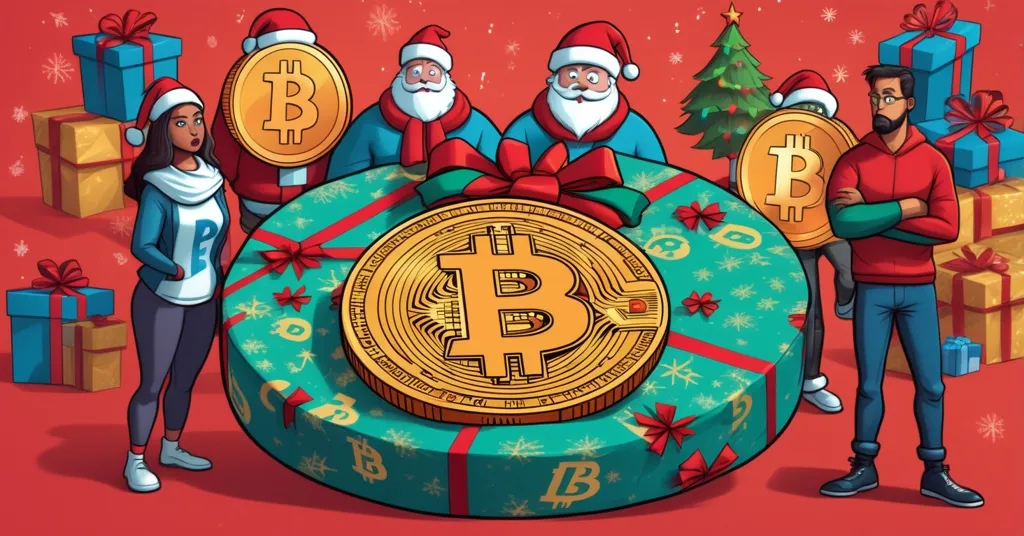PayPal’s $1.3M Bitcoin Giveaway: Holiday Cheer or Crypto Scam?

PayPal’s $1M Bitcoin Holiday Giveaway 2024: Hype or Scam?
PayPal has rolled out a massive holiday promotion for US customers, dangling over $1.3 million in Bitcoin prizes, including a staggering $100,000 grand prize for lucky winners. Yet, just as the fintech heavyweight aims to sprinkle some crypto magic, the community is raising eyebrows, smelling scam vibes, and questioning whether this is a genuine push for adoption or a slick marketing ploy.
- Giveaway Snapshot: Over $1.3M in Bitcoin prizes, with six $100K winners, 30 $10K winners, and 972 $500 winners.
- Community Buzz: Heavy skepticism abounds, with fears of hacks or scams fueled by the promo’s tone.
- PayPal’s Agenda: Ties into their crypto journey since 2020, amid stablecoin launches and acquisitions.
How the Bitcoin Giveaway Works
Running from November 17 to December 21, PayPal’s sweepstakes targets US residents aged 18 and older with a verified account. Getting in on the action is straightforward, though the fine print matters. Here’s the breakdown:
- Entry Options: Purchase at least $1 of qualifying cryptocurrencies—Bitcoin (BTC), Ethereum (ETH), Solana (SOL), Litecoin (LTC), Chainlink (LINK), or Bitcoin Cash (BCH)—via PayPal, or use a no-purchase mail-in method.
- Excluded Asset: PayPal’s own stablecoin, PYUSD, doesn’t qualify for entry, a curious omission for their in-house token.
- Entry Limits: Up to 10 entries per weekly draw period, with five periods total, each selecting 168 winners.
- Notification Process: Provisional winners are emailed within 10 working days; Tier 1 winners (the big $100K prizes) must verify identity within 5 days or risk disqualification.
The prize structure is tantalizing—six winners snag $100,000 in Bitcoin, 30 grab $10,000, and 972 pocket $500 each, totaling 1,008 lucky participants. PayPal hyped it on X with a playful tease:
“We’re not saying you’ll win $100K in bitcoin this week…but someone is going to. We’re giving away more than $1M in bitcoin prizes, No purchase necessary.”
But 10 days into the campaign, with no winners publicly confirmed, the crypto crowd isn’t exactly singing carols of trust.
Community Backlash: Scam or Legit?
The crypto community, battle-scarred from years of phishing traps and rug pulls, isn’t buying PayPal’s holiday cheer at face value. On X, sharp criticism has erupted, with many users expressing doubts about the promotion’s legitimacy as skepticism mounts. The operator of VPN service Windscribe didn’t mince words:
“Did the PayPal Twitter get hacked? Why does this read like I’m about to lose all my money in a rug pull somehow?”
Another user, Jorge A, a self-proclaimed tech tinkerer, echoed the suspicion:
“Jzz… Is this a Crypto Spam Post from @PayPal !?!? 😮 😅 This promo screams ‘enter your seed phrase.’!!!”
These aren’t just random hot takes—crypto’s dark side has taught enthusiasts to spot red flags faster than a miner spots a cheap GPU.
Still, not everyone’s wielding a pitchfork. One Bitcoin supporter offered a cautious nod:
“I don’t trust the PayPal mafia, but this is bullish for Bitcoin adoption.”
There’s a sliver of hope here—mainstream platforms like PayPal could onboard curious newcomers who’d never touch a hardware wallet. But with no transparency on winners yet, the jury’s out on whether this is a gateway drug for Bitcoin or a PR stunt ready to flop.
PayPal’s Crypto Journey: A Rocky Road
PayPal isn’t a newbie in the crypto arena. They jumped in back in October 2020, letting US users buy, hold, and sell BTC, ETH, LTC, and BCH during a time when Bitcoin’s price was soaring and institutional interest was peaking. By 2021, they introduced “Checkout with Crypto,” allowing direct payments to merchants using digital assets. Their stablecoin, PYUSD, hit the scene in 2023, boasting a market cap of $3.77 billion today. For the uninitiated, a stablecoin is like a digital dollar—pegged 1:1 to the US dollar with backing from cash and equivalents, unlike Bitcoin’s rollercoaster price swings. Issued by Paxos Trust Company, PYUSD aims for stability, yet its exclusion from this giveaway raises questions. Why not push your own token if you’re betting big on crypto?
But PayPal’s crypto track record isn’t all glitter and gold. Early adopters slammed them for sky-high fees and limited functionality—like not being able to withdraw crypto to personal wallets initially. These missteps fueled distrust, painting PayPal as a half-hearted tourist in a space that demands full commitment. Their stablecoin launch also caught flak for being too centralized, clashing with the self-sovereign ethos of Bitcoin. Now, with Paxos making power moves—snagging Fordefi, a New York-based digital asset storage firm, for over $100 million, and Finland’s Membrane Finance in early 2024—PayPal’s crypto ambitions are clear. Yet, snapping up firms like candy at Halloween doesn’t erase the skepticism of a community that’s been burned one too many times.
Risks vs. Rewards: Adoption or Exploitation?
Let’s cut to the chase: centralized platforms like PayPal come with baggage. Custodial wallets—where a third party holds your private keys, the digital passwords to your crypto—mean you’re not truly in control. It’s the opposite of “not your keys, not your crypto,” a mantra Bitcoiners live by, emphasizing self-custody for security and freedom. PayPal holding the reins could expose users to data harvesting—think transaction histories or personal info scooped up for marketing or worse. Past data breaches at PayPal, like the 2022 incident affecting thousands of accounts, only amplify these fears.
Then there’s the centralization clash. Bitcoin was born to disrupt gatekeepers, not cozy up to them. PayPal’s infrastructure, while slick and user-friendly, risks diluting the decentralized vision Satoshi Nakamoto laid out. On the flip side, their mainstream reach could accelerate crypto adoption—think effective accelerationism (e/acc) in action. If they play it right, pairing this giveaway with education on self-custody could turn skeptics into believers. But without transparency, like public winner announcements or blockchain-verified prize distribution, this risks being just another corporate data grab dressed in holiday wrapping.
The Bigger Picture for Bitcoin and Beyond
PayPal’s timing isn’t random. With Bitcoin back in the headlines in 2024 amid price rallies and regulatory shifts, and holiday spending in full swing, this giveaway could hook folks who’ve heard the buzz but never dared dive in. Compare this to other corporate crypto plays—Robinhood’s giveaways or Coinbase’s referral bonuses—and PayPal’s approach isn’t groundbreaking; it’s following a trend. What’s curious, though, is their inclusion of altcoins like Ethereum and Solana for qualifying purchases. Are they baiting speculators chasing the next big pump, or do they see broader blockchain utility beyond Bitcoin? As Bitcoin maximalists, we’d argue BTC doesn’t need to fill every niche—altcoins have their place for experimentation—but PayPal’s motives feel more like profit than principle.
The broader implication for decentralized tech is a tug-of-war. Mainstream exposure through PayPal could normalize crypto, bridging traditional finance with the wild west of blockchain. Yet, reliance on custodial giants risks sidelining the privacy and freedom Bitcoin champions. If users onboard via PayPal but never learn to hold their own keys, are we really advancing the revolution, or just building taller walls around the same old system?
Key Takeaways and Questions for Crypto Enthusiasts
- What’s behind PayPal’s Bitcoin holiday promotion?
It’s a sweepstakes for US users from November 17 to December 21, offering over $1.3 million in Bitcoin prizes, including $100,000 grand prizes, entered via crypto purchases or mail-in. - Why is the crypto community so distrustful?
The promo’s tone mimics common scams, and with no winners confirmed 10 days in, many fear it’s a hack or marketing stunt with ulterior motives. - Can this drive Bitcoin adoption forward?
Potentially, by exposing mainstream PayPal users to crypto, though trust issues and centralization concerns could dampen the impact. - What’s PayPal’s history in the cryptocurrency space?
They’ve been involved since 2020, supporting major coins, launching payment features in 2021, and rolling out PYUSD in 2023, despite criticism for fees and centralization. - What are the risks of centralized platforms like PayPal in crypto?
Custodial wallets mean they control your keys, risking data privacy and clashing with Bitcoin’s decentralized ethos, even if they offer scalability. - How does this fit into broader blockchain trends?
It reflects growing corporate interest in crypto, but reliance on gatekeepers could undermine the self-sovereignty that fuels the space’s revolutionary potential.
PayPal’s holiday gamble is a high-stakes play. On one side, it’s a bold step to fuse traditional finance with crypto, potentially turning curious bystanders into Bitcoin holders. On the other, it’s walking a tightrope over a pit of distrust—one slip, like delayed or opaque winner announcements, and the backlash will be brutal. As champions of decentralization, we applaud anything that spreads Bitcoin’s message, but we’re not naive to the pitfalls of centralized middlemen. Will PayPal’s festive push convert skeptics into believers, or just become another footnote in crypto’s ongoing trust battle? Only time—and verifiable transparency—will tell. Stay vigilant, folks; no prize is worth handing over your freedom.



